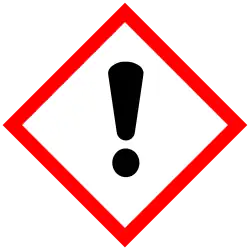Copper(I) thiophene-2-carboxylate
-thiophene-2-carboxylate.png) | |
| Names | |
|---|---|
| IUPAC name
Copper(I) thiophene-2-carboxylate
| |
| Other names
CuTC
| |
| Identifiers | |
3D model (JSmol)
|
|
| ChemSpider | |
| ECHA InfoCard | 100.161.358 |
| EC Number |
|
PubChem CID
|
|
| UNII | |
CompTox Dashboard (EPA)
|
|
| |
| |
| Properties | |
| C5H3CuO2S | |
| Molar mass | 190.68 g·mol−1 |
| Hazards | |
| Occupational safety and health (OHS/OSH): | |
Main hazards
|
Irritant |
| GHS labelling: | |

| |
| Warning | |
| H315, H319, H335 | |
| P261, P264, P271, P280, P302+P352, P304+P340, P305+P351+P338, P312, P321, P332+P313, P337+P313, P362, P403+P233, P405, P501 | |
| NIOSH (US health exposure limits): | |
PEL (Permissible)
|
TWA 1 mg/m3 (as Cu)[2] |
REL (Recommended)
|
TWA 1 mg/m3 (as Cu)[2] |
IDLH (Immediate danger)
|
TWA 100 mg/m3 (as Cu)[2] |
Except where otherwise noted, data are given for materials in their standard state (at 25 °C [77 °F], 100 kPa).
Infobox references
| |
Copper(I) thiophene-2-carboxylate or CuTC is a coordination complex derived from copper and thiophene-2-carboxylic acid. It is used as a reagent to promote the Ullmann reaction between aryl halides.[3]

CuTC catalyzed Ullmann coupling
References
- ^ Copper(I) thiophene-2-carboxylate at Sigma-Aldrich
- ^ a b c NIOSH Pocket Guide to Chemical Hazards. "#0150". National Institute for Occupational Safety and Health (NIOSH).
- ^ Shijie Zhang; Dawei Zhang; Lanny S. Liebeskind (1997). "Ambient Temperature, Ullmann-like Reductive Coupling of Aryl, Heteroaryl, and Alkenyl Halides". J. Org. Chem. 62 (8): 2312–2313. doi:10.1021/jo9700078. PMID 11671553.